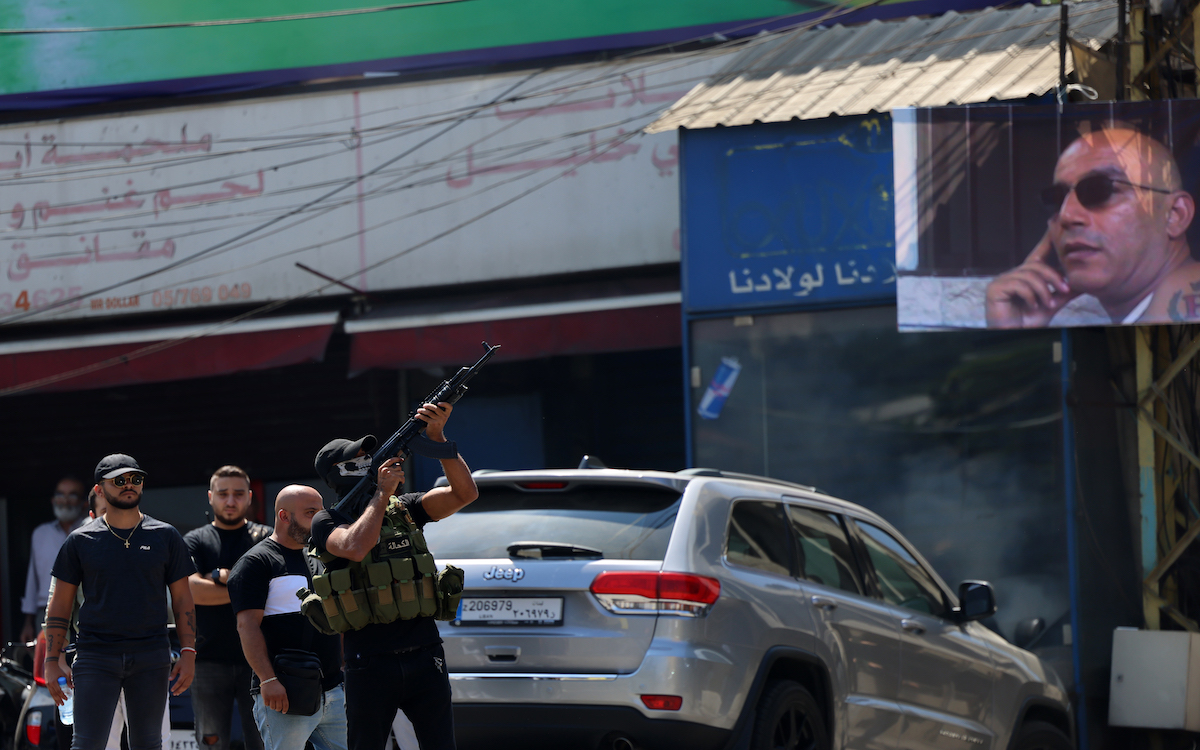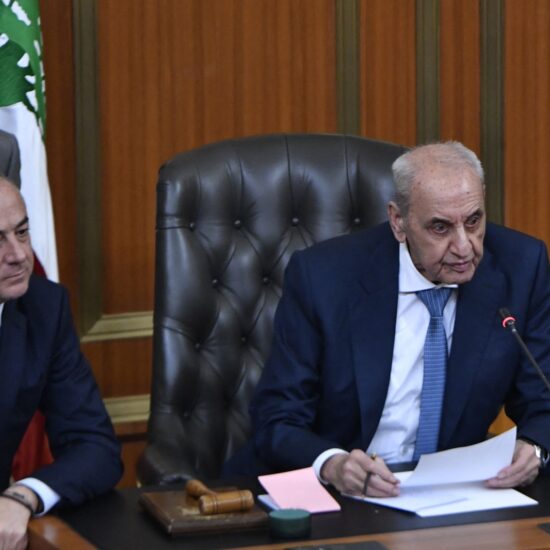
It has been just over a week since armed members of Hezbollah got into a shootout with residents of Kahaleh, resulting in deaths on both sides.
Even though some time has passed since the fighting, anger remains.
When the intelligence division of Lebanon’s security forces called on four people from Kahaleh to come in for questioning, the individuals in question refused, with the support of the entire village, saying that a proper investigation does not start with the villagers but, rather, with Hezbollah, who residents say started the fighting.
“We will not hand over anyone. We want the investigation to take its course with justice and fairness. We are under the roof of the law and the state,” the deputy mayor of Kahaleh, Ghassan al-Zoghbi stated defiantly. “We reject injustice against us, and the investigation must start from the “right” place, that is, who killed Fadi Bejjani.”
Samy Gemyel, head of the Kataeb Party, also rejected the summons.
“We stand alongside the people of Kahale, supporting their stances, and we will not remain silent about the truth,” he wrote on Twitter.
However, despite the heated statements and anger, analysts argue that the clashes are unlikely to have a significant impact on Lebanese politics.
“It’s still the same situation we were in before. The [political] camps haven’t really changed. These are the known [political] camps and lines among the political factions,” Anna Fleischer, director of the Beirut office for the Heinrich-Böll Foundation, told NOW.
More of the same
Following the clashes, the blowback on Hezbollah was almost instantaneous.
While the Shiite party put out a statement confirming that it was their truck that tipped over and that one of their people had been killed in the clash, it only added fuel to the fire when it put the blame on the Kahaleh residents for starting the fighting, claiming that their people came under fire from “armed men from militias located in the area.”
“We are not the militia, you are,” the Kahaleh residents shot back after Hezbollah’s statement was released.
Caesar Abi Khalil, an MP with the Free Patriotic Movement, which is currently in talks with Hezbollah about breaking the political deadlock in the country, also issued a condemnation of Hezbollah’s statement, saying that it “contradicts the truth.”
The most forceful statements came from Gemayel.
“We are no longer ready to coexist with these arms and this armed militia in Lebanon,” he stated.
“What would have happened if this truck was carrying explosives,” the politician added. “We cannot continue like this, we’ve reached the point of no return.”
Despite the strong language, nothing has really changed since the clashes.
I don’t think that there is an appetite for an internal conflict. The economic downturn and the economic collapse is felt by everyone. For sure to different degrees but everyone is feeling the economic problems.
Fleischer pointed out that the opposition in Parliament, consisting of the Lebanese Forces, Kataeb and independent “change” MPs, have opposed Hezbollah and its weapons long before the Kahaleh clashes occurred, and that their responses are nothing new.
The difference now, Fleischer said, had more to do with the high level of anxiety permeating throughout Lebanon.
“What is different now is that there is such a high level of anxiety in the country overall,” she said.
“If you follow the local news with the clashes in the south and Sidon, there was news circulating about embassies asking their citizens to leave and even the German embassy had to clarify that wasn’t the case for German citizens. So just the sense of anxiety is really high in the country.”
Even the possibility of things escalating further seems unlikely given the ongoing political and economic crises that Lebanon is facing.
“I don’t think that there is an appetite for an internal conflict. The economic downturn and the economic collapse is felt by everyone. For sure to different degrees but everyone is feeling the economic problems,” Fleischer explained.
This lack of an impact was echoed by Mohanad Hage Ali, a senior fellow at the Carnegie Middle East Center in Beirut, who told NOW that, at most, there will be a “short-term impact on the FPM shift towards Hezbollah,” but added that this impact would only be temporary.
The clashes, however, have put Gebran Bassil in a precarious position with his talks with Hezbollah. The FPM is looking to strike a deal to break the ongoing political deadlock that has prevented the election of a president for 298 days as well as to reach an agreement on things like broader economic and administrative decentralization, a popular demand amongst Lebanon’s Christians.
If Bassil fails to come away with any guarantees and only a name for the presidency, it could hurt him politically as the Kahaleh clashes ensured that Christian-Hezbollah relations reached a new low.
According to Hage Ali, if things were to escalate further, it could be in the event that Hezbollah forces through their presidential candidate, Sleiman Frangieh.
“Hypothetically, in case Hezbollah moves forward with Sleiman Frangieh, and the LF plus allies decide to oppose this through a de facto detachment from the central state, as they’ve insinuated previously, the Kahaleh clash could help justify this,” he explained.
But even this seems unlikely as Frangieh, while still officially remaining Hezbollah’s preferred candidate, has a slim chance of actually being elected as he lacks significant Christian support and Parliament remains evenly divided. So, even if Bassil and the FPM agree to back Frangieh, they still lack the necessary votes to have him elected.
On top of this, neither Fleischer nor Hage Ali view the events of Kahaleh as a significant escalation, instead arguing that previous clashes, in particular the October 14, 2021 Tayyouneh clashes, as being worse than what happened in Kahaleh.
A growing list
When Hezbollah and Amal Movement members got in a shootout in Tayyouneh in October 2021 after allegedly coming under fire from snipers from their rival the Lebanese Forces, it sent shockwaves throughout the country.
For many, it brought back memories of the May 2008 conflict when Hezbollah soldiers stormed the streets of Beirut or, for those who lived throughout it, even the 15-year civil war that came to an end in 1990.
This seems to have been an accident that, yes, shows the military capabilities of Hezbollah but it wasn’t a planned show of power or anything like that.
Both Fleischer and Hage Ali argued that the events of Tayyouneh were much worse than what happened in Kahaleh.
“Tayyouneh was much worse as an escalation because it was planned, it was targeted and it really terrorized the civilian population inside Beirut,” Fleischer said. “This seems to have been an accident that, yes, shows the military capabilities of Hezbollah but it wasn’t a planned show of power or anything like that.”
Fleischer, however, also insisted that it was important to not downplay the terror that was inflicted by the fighting in Kahaleh, but emphasized that the fighting only occurred because of an accident that is frequent throughout Lebanon’s roads and that it lacked any prior planning or organization.
Tayyouneh also differed drastically from the events of Kahaleh in that it was an expression of Hezbollah’s staunch opposition to the August 4 Beirut Port explosion investigation and demanding that Tarek Bitar be removed from the investigation.
However, just as when Hezbollah attempted to put the blame for the Tayyouneh clashes on Bitar, Hezbollah looked to do the same with Kahaleh by claiming that the village residents had instigated the shooting, and even went as far as to blame the Lebanese broadcaster MTV for helping to spark the violence.
In the end, Fleischer said that the fighting in Kahaleh is more of an “isolated incident” and that it “looks like one of those things that goes into the list of grievances” that people have against Hezbollah and its weapons.
While many have expressed anger about what happened in Kahaleh and have demanded that something be done about Hezbollah and its weapons, the likelihood of anything actually happening remains slim, making further clashes in the future only more of a possibility.
Nicholas Frakes is a senior reporter with @NOW_leb. He tweets @nicfrakesjourno.








